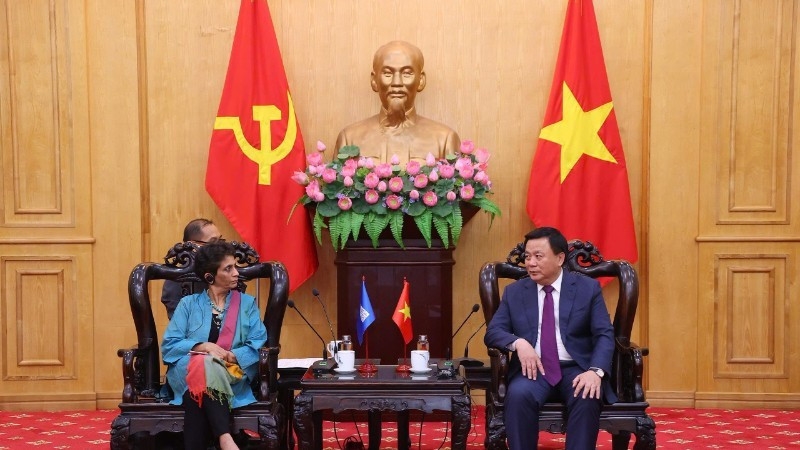The consensus was reached at a working session in Hanoi on September 4 between Prof., Dr. Nguyen Xuan Thang, Politburo member, President of the Ho Chi Minh National Academy of Politics, and Chairman of the Central Theoretical Council, and Kanni Wignaraja, U.N. Assistant Secretary-General, UNDP Assistant Administrator, and Director of the UNDP Regional Bureau for Asia and the Pacific.
    |
 |
|
Politburo member Nguyen Xuan Thang (right), President of the Ho Chi Minh National Academy of Politics and Chairman of the Central Theoretical Council, receives Kanni Wignaraja, U.N. Assistant Secretary-General, UNDP Assistant Administrator, and Director of the UNDP Regional Bureau for Asia and the Pacific. |
Thang highlighted Vietnam’s commitment to inclusive development, with emphasis on improving healthcare, ensuring citizens' well-being, advancing development in ethnic minority regions, and promoting women’s participation in leadership positions.
He said Vietnam is undergoing governance reforms, particularly the shift from administrative management to serving the people and fostering development. The Politburo's recent resolutions are key drivers for economic and social growth and to enhance Vietnam’s global standing.
The country is simultaneously accelerating digital transformation, applying advanced technologies such as artificial intelligence, and addressing challenges related to data use and social polarization, Thang noted.
Administrative restructuring has brought notable results, including the streamlining of local administrations from three tiers to two, a sharp reduction in commune-level units, and the reorganization of provincial units.
Wignaraja expressed appreciation for Vietnam’s progress, acknowledging the long-standing cooperation with the Academy, particularly the success of the Provincial Governance and Public Administration Performance Index (PAPI).
She noted UNDP’s recognition of Vietnam’s strong political will to embrace new technologies and foster human resource development. Vietnam’s experience could serve as valuable lessons for other countries.
Both sides agreed to jointly implement the program “Strengthening Inclusive Governance in Vietnam (IGEP – PAPI 2.0)” for 2026–2031, alongside enhancing research and policy advisory capacity in 2025.
They also discussed prospects for joint studies, knowledge-sharing initiatives, and training programs for leaders and managers, aiming to advance inclusive and sustainable development in Vietnam.
Source: VNA